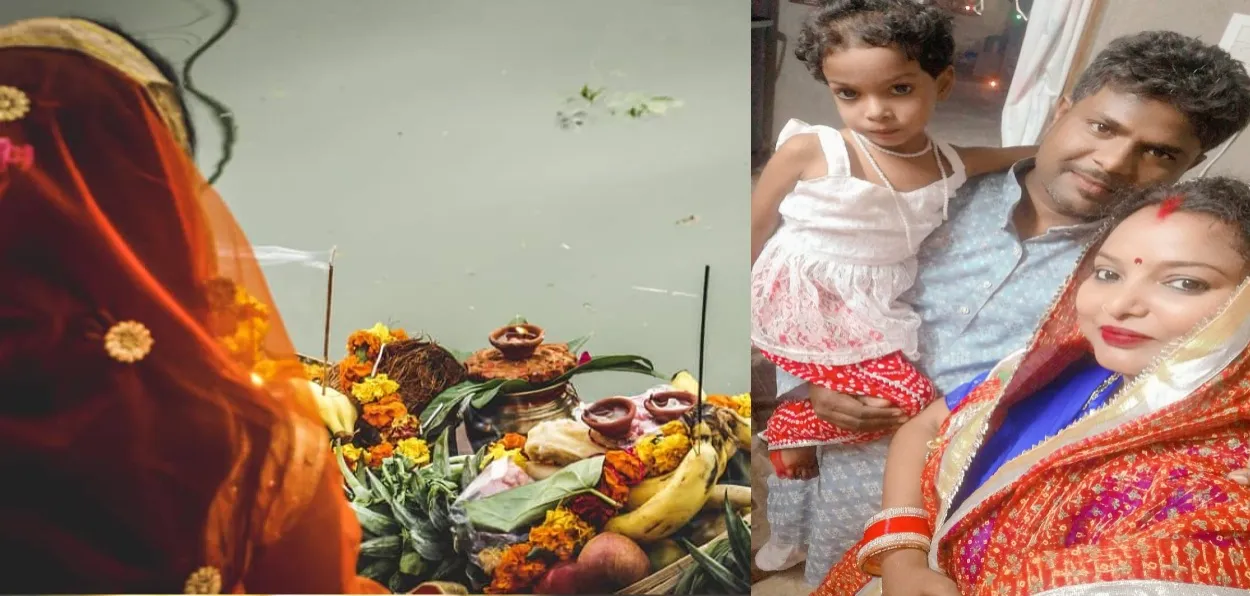
Rana Siddiqui Zaman/Asansol (West Bengal)
When I met Seerat Jahan, a mother of four-year-old daughter Myra, she was busy preparing for Chhatth; a significant four-day festival of Sun worship among Hindus in eastern India. Seerat, a Muslim girl living in Asansol, West Bengal, is married to Rahul Rajat, a Hindu.
I first met her on Diwali as she was joyfully creating a tiny mud house (gharonda) in which she had placed miniature clay utensils to invite prosperity to her family. It is a Hindu custom performed by every household during Diwali.
Seerat, a graduate, was a working professional before her daughter was born. A few years ago, she met Rahul while working at a courier company’s back office. Daughter of a caretaker at a well-heeled Muslim household for over three decades, Seerat had seen hardships in the absence of her father.
Rahul and Seerat tied the knot seven years ago. They held a nikah ceremony. On paper Rahul became Rehan. Today, Rahul who works as a delivery personnel with a well-known online shopper’s platform doesn’t mind being called Rehan by his wife’s family.
Inter-religious marriage in a small city like Asansol is a daring step despite the city boasting great communal harmony consisting of people from Bengal, Bihar, Kolkata, and parts of U.P and Punjab.
Seerat and Rahul’s love story is worth being turned into a movie. They met at work while Rahul faced an emotional upheaval due to a break-up. Seerat helped him come out of the depression by motivating him and caring for him.
“It took quite many years”, Seerat recalls. She was already fighting at several fronts, - financial, physical to social challenges.
“I was living with my maternal uncle and aunt in the absence of my father, doing odd jobs. My mother worked as a domestic help and caretaker at a house where she would stay from early morning till late at night. Despite knowing our condition, all the marriage proposals from Muslim families were insulting and of dowry seekers though Islam strictly prohibits it. Some wanted a bike, some gold and cash; some rejected me for my skin colour and fat body. I went up to Delhi to meet the right guy. I got sick of all that and requested my uncles to marry off their daughters and not wait for me,” Seerat recalls with moist eyes.
Like best friends Rahul who hails from Bihar and Seerat, a local-born would discuss their problems with each other. “He helped me sort most of my problems in the absence of those I consider my own.”
“So when Rahul proposed to her, Seerat had only one thought – would their families accept them? “He didn’t ask for any dowry while most of the proposals from Bihar came with a demand for no less than 5 lakhs in cash even if the boy is jobless,” she says.
The couple decided to marry only after being blessed by their families. Seerat had to persuade her mother. The mother also had to persuade the Muslim family she worked and stayed with for over three decades.
“I told my mother to meet Rahul and that if she didn’t find him suitable, I would change my decision.” It worked.
Rahul says, “I had to persuade my parent. They took time to come around as Seerat is a very well-behaved, patient, and polite girl. We were colleagues and had known each other for almost six years. Nikah was an issue too. But I knew without changing my name Nikah was not possible. But now I am okay with whosoever addresses me with both my names, I remain what I am.”
“We have never pushed her to perform any pooja or not celebrate her festivals like Eid and Bakra Eid. We celebrate all these festivals together. Our religion never became a hurdle in our way, but a means to celebrate both cultures. I am not particularly religious but when asked, I visit temples for the performance of pooja, etc. Our child is getting to know the great cultural assimilation without the boundary of religion,” Rahul says.
The duo has decided to leave the choice of religion to her daughter as she grows up.
It is interesting to note that Islam does not discourage inter-faith marriage especially if Man is a Muslim. Some Muslim scholars quote surah Baqrah that ‘prohibits’ inter-faith marriage due to complications that may arise.
This stand remains highly controversial to date. However, notably, The Quran encourages inter-faith interactions and quotes, “There is no compulsion in the matters of religion”.
Rahul and Seerat live as a happy couple in the same building where Raul’s parents live.
"My parents-in-law are very understanding and respectful towards me, so is my sister-in-law, who has become my buddy. Myra has brought all of us closer too,” Seerat says gleefully while the husband nods in agreement.
ALSO READ: Muslim women also celebrate Chhat festival in Bihar
Rahul echoes, “We had proposals from Hindu families. And Seerat’s arrival was looked upon as a threat to our culture and food habits. But it could be so with anyone. I was sure of her, not of any unknown person. I had my share of painful experiences from my early relationship with the girl of my religion. After I brought Seerat home as a wife, none of my parents’ or siblings’ fears came true. Some of our scars remain from both sides though, but that’s life,” he smiles nearly clasping Seerat and Myra fondly.
At this moment, nothing seemed better than witnessing a contented family. Religion can be taken care of, if the need be.
